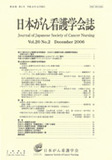Japanese
English
- 販売していません
- Abstract 文献概要
- 参考文献 Reference
- サイト内被引用 Cited by
要旨
本研究は,末期がん患者の病院から在宅への移行期における訪問看護師の認識と判断を明らかにするために,5名の訪問看護師を対象に参加観察と半構成的面接により得たデータを質的帰納的に分析した.訪問看護師は,準備期に患者・家族の在宅療養への思いを捉えて不安に寄り添い,病院医療者との関わりの難しさや患者・家族との関係を捉えながら,患者・家族の病状の受けとめを知り真実を伝えるよう病院医療者へ促し,がんに伴う苦しみを捉え和らげる判断をしていた.準備期の認識内容はすべて在宅療養の可能性を見極める基になり,判断内容は家での看取りに備えることにつながっていた.開始期に訪問看護師は患者・家族の家で過ごすことの意味を認識すると,急変に備えながらがんに伴う苦しみを捉えて和らげ,患者と家族の心の揺れを認識し支える判断をしていた.また,訪問看護師が患者や患者を看取る家族を支援するためには,信頼関係を構築する努力が必要であり,それが在宅療養の継続を支えていた.開始期のすべての認識内容は在宅療養継続への見極めに,判断内容は在宅療養継続の意思を固めることにつながっていた.以上の結果により,真実を伝え心の揺れを支える,がんの苦しみを和らげる,介護の主体者である家族を支える,患者・家族と信頼関係を構築する,在宅療養の可能性を見極める,病棟医療者と協働する難しさがあるという特徴が明らかとなった.
Abstract
The purpose of this study was to identy cognition and decision making of 5 home care nurses of the terminally cancer patients in transition from hospital to home. Data were collected by semi - structured interviews and participant observation, and were analyzed qualitatively and inductively. Before discharging, home care nurses knew the patients' and families' mind, and accepted it. While the nurses were perceiving difficulty about collaborating with hospital physicians and nurses, they judged to make sure that patients and families knew about the truth, to prompt the hospital clinicians to tell it them, to predict and mitigate their suffering. They ascertained whether the patients returned home, based on their cognition, and prepared home care. After discharging, they perceived their meaning of being at home, predicted and mitigated their physical and psychological suffering. In order to assist sustainability of home care, nurses effort to build trust with the patients and their families. Their cognition and decision making after discharge lead to ascertain whether they were continually being at home, confirm their decision. These findings suggested the features tell the truth to them and relieve their psychological suffering, control cancer pain, support caregivers, establish relationships to them, ascertain they are at home, are difficult to cooperate with hospital medical staff in transition for terminal cancer patients.
Copyright © 2006, Japanese Society of Cancer Nursing All rights reserved.


